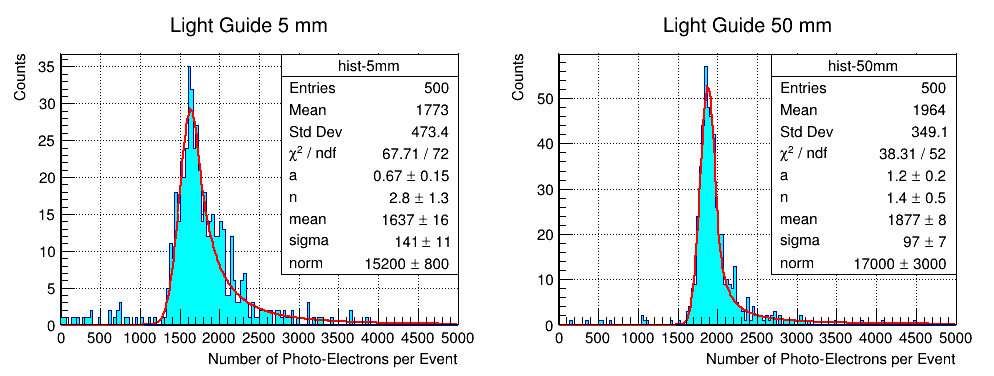🏠️ Project homepage: https://petrstepanov.com/root-utils
🐱 Github repository: https://github.com/petrstepanov/root-utils
Shared library for ROOT framework containing list of common functions we use in multiple projects. Library is developed in order to reduce the codebase bloating of each particular ROOT-based program.
- FileUtils has shortcuts for opening series of ROOT files in a directory.
- FitUtils has implementation of a Crystal Ball function. Regular and reversed.
- HistUtils provides easy to access histogram operations: invert, crop etc...
- StringUtils will have common string operations: remove extension, print ASCII progress bar.
- UiUtils has a wrapper for the ROOT message box and file picker.
Below please find an exemple of fitting a histogram with the Crystal Ball function:
#include <FitUtils.h>
...
// Regular Crystal Ball function
TF1 *cBall = FitUtils::getCrystalBallFunction(hist);
// Reversed Crystal Ball function
TF1 *cBallReversed = FitUtils::getCrystalBallFunction(hist, kTRUE);
// Fitting
hist->Fit(cBall);
// Obtaining fit function moments as a pair (value and error)
// Second parameter (boolean) reflects if current function is reversed
TVector2 mean = FitUtils::getCrystalBallMean(cBall, kFALSE);
TVector2 dispersion = FitUtils::getCrystalBallDispersion(cBall, kFALSE);
// Additionally it is possible to calculate resolution of the distribution as follows
TVector2 resolution = FitUtils::getCrystalBallResolution(cBall, kFALSE);
Library namespaces documentation can be found here: https://petrstepanov.com/root-utils/namespaces.html
This is the preferred installation option. Installation depends on prerequisites:
- Have
cmakeversion 3.XX program installed on computer. Usually CMake is included in Linux "Development Tools" group package. On older distributions CMake v3.XX may be namedcmake3. - ROOT environment should be sourced in the current shell. Tested with ROOT v6.26.XX.
First we download the repository and create an out-of-source build folder.
mkdir -p ~/Downloads && cd ~/Downloads
git clone https://github.com/petrstepanov/root-utils
mkdir -p ./root-utils-build && cd ./root-utils-build
Next we invoke CMake. It ensures that all the dependencies are satisfied and generates GNU Makefile. Finally, we execute Makefile's install target:
cmake ../root-utils
cmake --build . --target install
Makefile generates dictionary, builds shared libaray, compiles code into object files, links the executable, and installs corresponding files files in required locations.
Tip. If above command requires administrator privilleges that current user does not have, the install prefix can be changed to a local install:
cmake -DCMAKE_INSTALL_PREFIX=$HOME/.local ../root-utils
cmake --build . --target install
Additionally, $PATH, $LD_LIBRARY_PATH, and $CPLUS_INCLUDE_PATH environemnt variables need to be modified for the library to be discoverable. Below please find an example how to do it in BASH and CSH shells:
echo "export PATH=$HOME/.local/bin:$PATH" >> $HOME/.bashrc
echo "export LD_LIBRARY_PATH=$HOME/.local/lib:$LD_LIBRARY_PATH" >> $HOME/.bashrc
echo "export CPLUS_INCLUDE_PATH=$HOME/.local/include:$CPLUS_INCLUDE_PATH" >> $HOME/.bashrc
echo "setenv PATH $HOME/.local/bin:$PATH" >> $HOME/.cshrc
echo "setenv LD_LIBRARY_PATH $HOME/.local/lib:$LD_LIBRARY_PATH" >> $HOME/.cshrc
echo "setenv CPLUS_INCLUDE_PATH $HOME/.local/include:$CPLUS_INCLUDE_PATH" >> $HOME/.cshrc
This should do the trick.
